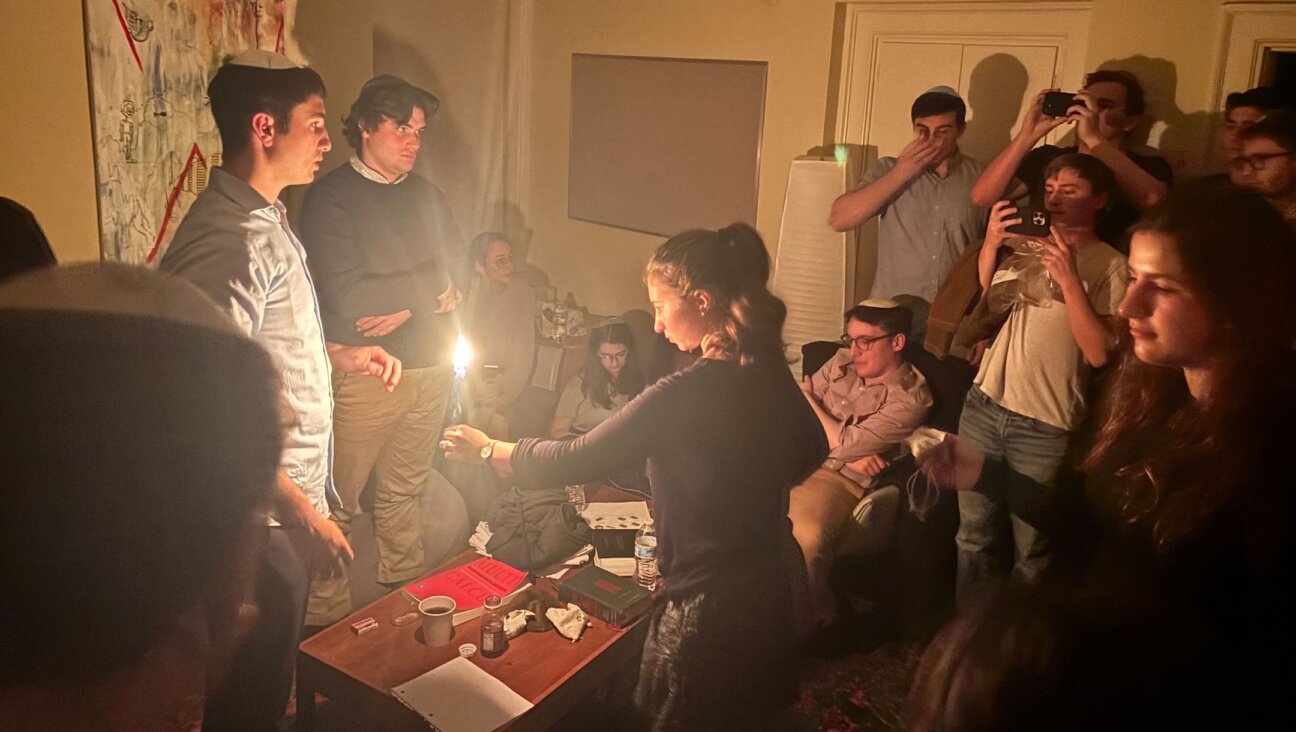Caftans and Tank Tops Mingle Breezily On Long Island’s East End
Southampton, N.Y. – Gawking is a common enough pastime at summertime beach resorts, but the scene along one of this exclusive enclave’s main thoroughfares last Sunday grabbed more attention than the sleek convertibles and toned sunbathers that customarily have vacationers craning their necks. With a maroon wedding canopy at its head, a procession of about 250 revelers marched a newly inked Torah along the few hundred yards of hedge that line the way from the inn where the scroll’s lavish dedication ceremony was held to the wood-shingled Chabad house that will serve as the Torah’s new home — a building that, eight years ago, earned the distinction of becoming the first-ever synagogue in the village’s 350-year history.
With its pomp, ceremony and — most of all — its chupah, a Torah dedication is often likened to a wedding. But if there was a union celebrated here this week, it was between a pair of rather strange bedfellows. Southampton, the first English settlement in New York, has long been considered the WASPiest nook of the 40-mile stretch known collectively as the Hamptons, and Chabad is, well, Chabad: a Hasidic sect with the miraculous ability to assimilate itself into the most unlikely of locales, even if those locales have a track record of hostility toward Jews.
Still, for all its surface peculiarity, Sunday’s Torah dedication, when viewed in light of the recent history of those who summer on Long Island’s East End, makes a certain kind of sense. The towns that constitute the Hamptons are hardly the restricted bastions they once were. Boomer professionals changed all that. Indeed, according to Steven Gaines, author of the best-selling 1998 Hamptons history “Philistines at the Hedgerow,” the fact that the Hamptons are considered a fun and exciting place today is thanks largely to the area’s Jewish population. This spirit of openness has, in recent decades, only grown, paving the way, in the past 15 to 20 years, for a group that never really visited the Hamptons before: the Orthodox.
And yet, and yet. Maybe it’s the sea air, maybe it’s the sun, but Orthodoxy in the Hamptons doesn’t mean quite what it does three hours to the west. Hamptons Orthodoxy is fluid, it’s forgiving, it’s flexible. In short, it’s not all that orthodox.
Rabbi Marc Schneier, who presides over Modern Orthodox congregations both in Manhattan and in the Long Island village of Westhampton Beach, made his first Hamptons foray in 1990. “That summer, I held services in a private home,” Schneier told the Forward. “Today, on Shabbat, we have between six and seven hundred people.” Southampton’s rabbi, Rafe Konikov, was invited to town in 1994 by a single individual, a Belgian-born diamond dealer named Jacqui Ekstein. Today, Konikov said, his congregation boasts more than 1,000 supporters.
Yet, asked if their recent successes offer evidence of an Orthodox boom in the Hamptons, both rabbis hesitated. “I’m an Orthodox rabbi with a Conservative congregation and a Reform membership,” said Schneier, who spoke of his congregation, the Hampton Synagogue, as being as much a center for culture as it is a house of worship. And indeed, Schneier does have an impressive array of speakers lined up for the summer (including, it should be said, the Forward’s Alana Newhouse). The Hampton Synagogue is also famous for its sumptuous buffets. “I tell people,” Schneier said, “that the three most important words for synagogue attendance are ‘Kiddush to follow.’”
Konikov similarly underplayed the religious nature of his enterprise. “The majority of the people who are going to be there,” he said a few days before his Torah-dedication ceremony, “will be nonreligious.” It was no lie. The event had more in common with a garden party than it did with a Lubavitcher farbrengen. No effort was made to keep men and women separate, and the dress code veered more toward Hamptons Chic than toward Crown Heights Modest.
The Hamptons are bracketed by two Jewish institutions: Schneier’s synagogue in Westhampton Beach and, 30 miles down an often traffic-choked highway, the Reform-affiliated Jewish Center of the Hamptons, in East Hampton. It, too, knows a thing or two about flexible denominational boundaries. When, amid charges of plagiarism and financial impropriety, the synagogue opted not to renew its rabbi’s contract last year, his temporary replacement, Myron Fenster, did not come with the standard Reform rabbi’s résumé. The product of an Orthodox upbringing, Fenster, a graduate of Yeshiva College, served for many years as the rabbi of the Shelter Rock Jewish Center in Roslyn, N.Y., a Conservative congregation.
“Maybe there’s something about summer resort Judaism that allows for relaxation on all sides,” suggested Princeton University historian and Forward columnist Jenna Weissman Joselit when asked to reflect on the current Hamptons scene. “Maybe there’s a kind of playfulness that goes along with summer: You try this, and you try that. Maybe it’s kind of chic, in a way, to be involved with Chabad. Maybe it’s even a little transgressive.”















